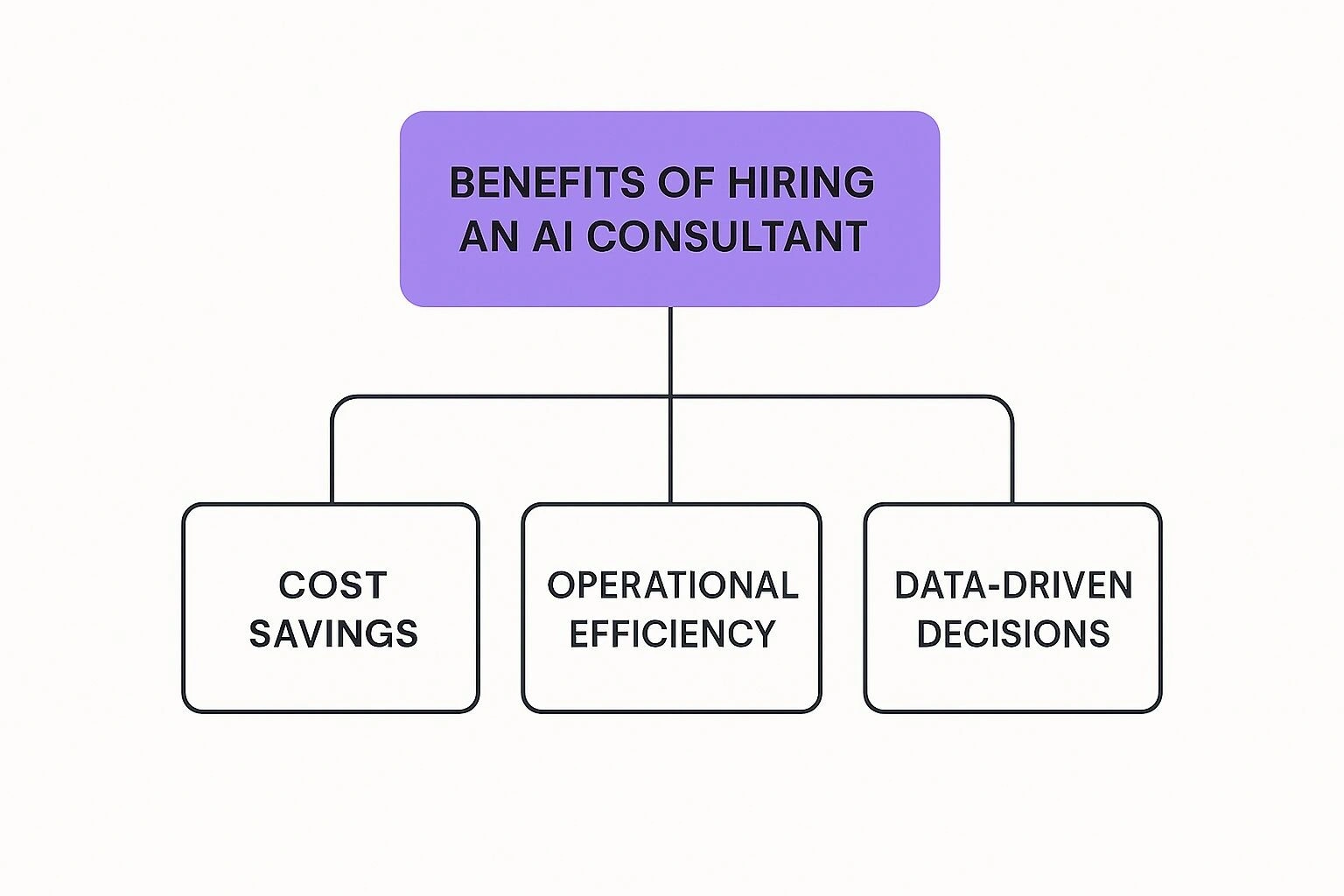What Does an AI Consultant Do?
Learn what does an AI consultant do and how they transform business goals into technical solutions to drive growth for Australian companies.

An AI consultant is a partner who’s job it is to figure out where a business is struggling with repeative manual work, and designs AI systems to fix it. They are the expert guides who can translate the often-abstract potential of artificial intelligence into a practical engine for business growth. Their focus is always on making sure any AI project is tied directly to real commercial goals.
The Architect of AI Business Transformation
For many businesses, artificial intelligence feels like looking at the schematic for a complex machine—you know it’s powerful, but you have no idea how to put the pieces together. This is precisely where an AI consultant steps in and proves their worth. It helps to think of them less as a technician and more as a specialist architect, overseeing a critical project from the initial survey right through to the final sign-off.
Their first job is to properly survey the business landscape. They need to find the foundational weaknesses or spot the hidden opportunities for improvement. Just as an architect assesses the ground before designing a building, the consultant gets deep into your workflows, data infrastructure, and overarching strategic objectives. This diagnostic phase is absolutely critical; it’s what ensures the final AI solution is built on solid ground and solves the right problems.
From Blueprint to Reality
Once they have the lay of the land, the consultant draws up the blueprint. This goes far beyond just picking a few algorithms off a shelf; it’s about crafting a comprehensive strategy. For Australian enterprises, this strategy needs to answer some tough questions:
- What problem are we actually solving? This means getting specific. Are we trying to cut operational costs in a manufacturing plant or deliver hyper-personalised experiences for an e-commerce store?
- What’s the real business case here? It’s all about defining the expected return on investment. Will this come from hard cost savings, new revenue streams, or a big jump in efficiency?
- How will we know if it’s working? Clear metrics and key performance indicators (KPIs) have to be established from the outset to track the solution’s real-world impact.
An effective AI consultant doesn’t just deliver technology; they deliver business outcomes. Their job is to make sure the sophisticated engineering behind AI serves a clear, strategic purpose, turning abstract ideas into a real competitive edge.
Finally, the consultant manages the build itself. They act as the crucial link between the technical teams—the data scientists and engineers—and the business leadership. This ensures the project not only stays on schedule but also remains true to the original vision. It’s this oversight that guarantees the final product isn’t just technically impressive, but is perfectly suited to the unique operational realities of the enterprise.
Crafting Your AI Strategy and Roadmap

Getting AI right isn’t about chasing the latest tech. It all starts with a clear, well-defined strategy. The first—and most important—job of an AI consultant is to act as a strategic guide, bridging the chasm between ambitious business goals and what AI can realistically achieve.
Long before a single line of code gets written, they’re digging deep into the business itself. This isn’t just a quick tech audit. We’re talking about intensive stakeholder workshops, thorough data-readiness checks, and mapping out existing workflows to get a complete picture of an organisation’s real-world challenges and untapped strengths.
Building Your Bespoke AI Roadmap
Once that deep-dive is complete, the consultant can start building a bespoke AI roadmap. You can think of this as the architectural blueprint for the company’s entire AI journey. It’s a detailed plan that lays out every step with precision and a clear sense of purpose.
This roadmap is really the core answer to the question, “what does an AI consultant do?”. It’s the tangible plan that connects the dots between technology and genuine business outcomes. A solid roadmap will always include:
- Prioritised Projects: A logical sequence of AI initiatives, ranked by their potential impact and how feasible they are to implement.
- Clear Timelines: Realistic schedules for building, testing, and rolling out each project.
- Resource Allocation: A detailed breakdown of the budget, people, and specific technology needed.
- Risk Assessment: A frank look at potential roadblocks, from poor data quality to tricky regulatory hurdles.
The whole point of an AI roadmap is to take the guesswork out of the equation. It makes sure every dollar invested is deliberate and contributes to a real competitive advantage, stopping businesses from wasting money on dead-end tech experiments.
Aligning Technology with Business Objectives
Ultimately, this strategic blueprint ensures that technology serves the business—not the other way around. It gives leadership a clear line of sight from investment to return, making the value of AI concrete and easy to justify. This kind of strategic guidance is especially critical for navigating Australia’s AI market, which is expected to swell to USD 7.76 billion by 2033.
The roadmap isn’t a one-and-done document; it’s a living guide that informs decisions and keeps the entire organisation on the same page. By charting a clear path forward, an AI consultant helps businesses sidestep common pitfalls and sets them up for meaningful, long-term success. Our guide to AI consulting services for business growth offers more detail on how this strategic approach plays out in the real world.
Turning AI Blueprints Into Reality

Once the strategic roadmap is locked in, the AI consultant’s job shifts from architect to project leader. This is the crucial point where theory meets execution, and their deep technical know-how really comes into play. Their main task is now to guide the company’s own teams through the often tricky process of building, testing, and rolling out the planned AI solution.
They act as the main point of contact for data scientists and software engineers, keeping everyone focused on the original business goals. During this phase, the consultant gets deep into the technical details. They oversee everything from picking the right machine learning algorithms to setting up solid data pipelines that ensure the model gets fed clean, reliable information.
From Model Development to System Integration
A consultant’s oversight makes sure the technical groundwork is not just powerful, but also practical for the organisation’s unique situation. It’s their responsibility to confirm that the infrastructure—whether it’s on-premise servers or a cloud setup—is robust enough to handle the AI model as it scales.
This stage is all about hitting a series of vital technical milestones:
- Algorithm Selection: Pinpointing the best models for the job, whether it’s regression for forecasting, classification for sorting, or clustering for grouping data.
- Data Pipeline Construction: Designing and checking the automated workflows that pull in, clean up, and process data for the model to learn from.
- Model Training and Validation: Managing the cycle of training the AI on historical data and then testing it relentlessly to ensure its accuracy and performance hit the mark.
But just building a working model isn’t enough. A huge part of the consultant’s job is to make sure this new AI tool fits neatly into the company’s existing software. After all, an AI solution that’s isolated from everything else offers almost no real business value.
A consultant truly proves their worth when they can weave a new AI capability into the very fabric of daily operations. The aim isn’t just to build a clever model, but to make its insights easy to access and act on within the systems people already use every day.
A Practical Example in Action
Let’s think about a large Australian mining company that wants to cut down on expensive equipment failures. An AI consultant, having already laid out the strategy, now leads the charge to build a predictive maintenance model. This model will sift through sensor data from massive haul trucks to predict when a part might fail.
Here, the consultant wears many hats. They steer the data science team as they train the algorithm on years of maintenance records and live sensor feeds. Just as importantly, they work with the IT department to pipe the model’s predictions straight into the dashboard the site managers already use.
This means a manager doesn’t need a PhD in data science. They just get a simple alert: “Truck 7 requires hydraulic inspection within 48 hours“. By connecting a complex AI model to a straightforward business tool, the consultant turns a detailed blueprint into real, measurable value on the ground. You can find out more by reading our guide to choosing an AI consulting company in Australia that can manage these processes.
The Essential Skills of a Top AI Consultant
So, what really separates a great AI consultant from a good one? It’s a rare and powerful mix of deep technical know-how, sharp business intuition, and genuinely clear communication. When someone asks, “what does an AI consultant do?”, the real answer lies in understanding this unique fusion of skills. They can’t just be a coder or a strategist; they have to be a master of both worlds.
At their core, top-tier consultants have serious technical chops. This isn’t about knowing the latest buzzwords; it’s about having a hands-on, practical command of the disciplines that form the backbone of any successful AI project. These technical skills are the absolute price of entry for anyone hoping to guide a complex enterprise implementation.
Technical and Strategic Foundations
A consultant’s expertise is really a tale of two skillsets: the hard technical skills and the softer, but equally critical, strategic abilities.
To give you a clearer picture, here’s a breakdown of how those skills are divided.
A Comparison of Technical and Strategic Skills
| Skill Category | Examples of Key Competencies |
|---|---|
| Technical Proficiency | Deep understanding of machine learning algorithms, natural language processing (NLP), and data engineering. Proficiency in major cloud platforms like AWS, Google Cloud, or Microsoft Azure is essential for building and scaling solutions. |
| Strategic Acumen | Strong analytical problem-solving to diagnose business challenges. Commercial thinking to craft a compelling business case. Robust project management to keep complex initiatives on time and on budget. |
Ultimately, it’s the seamless integration of these two areas that allows a consultant to deliver real, tangible results rather than just a piece of technology.
Perhaps the most valuable skill an AI consultant has is their ability to act as a translator. They must be able to take incredibly complex technical concepts and distill them into a clear, compelling business case that gets non-technical leaders excited and secures crucial executive buy-in.
This is where theory meets reality, and it’s how abstract ideas turn into measurable gains like cost savings and improved efficiency.

As the diagram shows, a consultant’s true value isn’t just in delivering a piece of tech; it’s in driving measurable business outcomes.
The Art of Communication and Translation
Without rock-solid communication, even the most brilliant technical solution is destined to fail. A huge part of a consultant’s job is bridging the gap between very different teams.
One moment, they might be explaining the practical limitations of a machine learning model to a marketing director. The next, they’re translating that director’s high-level strategic goals into precise technical requirements for the data science team.
This dual fluency is what elevates an average consultant to a truly high-impact partner. It’s what ensures the final product is perfectly aligned with the business’s real-world needs, preventing costly missteps and guaranteeing the solution delivers genuine, measurable value. This unique combination of skills truly defines the role.
Managing AI Ethics, Governance and Risk

Rolling out artificial intelligence isn’t just about overcoming a technical hurdle; it cracks open a whole new world of ethical questions and governance headaches. A huge part of an AI consultant’s job is to navigate this tricky terrain, making sure that new systems are not only powerful but also fair and responsible.
This isn’t just a box-ticking exercise. It’s a core function that goes beyond the code to look at how AI actually affects real people. The consultant’s first move is to build a solid governance framework right from the start. Think of it as a set of guardrails for the business, protecting it from potentially devastating legal, financial, and reputational fallout.
Establishing Robust Governance Frameworks
A consultant’s work here is all about being proactive, not waiting for something to go wrong. They set up clear guidelines and oversight processes to manage an AI model’s entire life, from the initial data it learns from to the decisions it makes out in the wild. It’s about building a system of checks and balances from the ground up.
This usually involves tackling a few critical areas:
- Data Privacy and Compliance: Making absolutely sure that all data handling meets strict Australian regulations like the Privacy Act, keeping sensitive customer information secure at every single step.
- Algorithmic Bias Mitigation: Proactively hunting for and correcting biases within AI models that could lead to unfair or discriminatory outcomes.
- Transparency and Explainability: Ensuring that the decisions made by AI aren’t coming from an impenetrable “black box.” A consultant works to make these models understandable to everyone involved.
Imagine a consultant is helping a bank implement a new AI algorithm for approving loans. Their job is to guarantee it doesn’t accidentally penalise certain applicants because of biases lurking in historical data. This means putting the model through its paces with rigorous testing and setting up continuous monitoring to spot any discriminatory patterns that might emerge over time.
An AI consultant’s ethical oversight is non-negotiable. Their duty is to ensure that in the pursuit of efficiency and innovation, the organisation’s commitment to fairness, transparency, and customer trust is never compromised.
Protecting the Business and Building Trust
Ultimately, this intense focus on ethics and risk is about securing the long-term health of the business. A single biased algorithm or a data breach can inflict massive reputational damage that takes years to mend, destroying customer trust and attracting unwanted attention from regulators.
By weaving strong governance principles into the AI strategy from day one, a consultant helps create solutions that are not only effective but also trustworthy. This responsible approach is the bedrock of sustainable success with AI, turning potential minefields into a source of competitive advantage and lasting customer loyalty.
How AI Consultants Drive Real Business Value
At the end of the day, an AI consultant’s worth is measured by the tangible, bottom-line value they create. It’s not about delivering fancy strategy documents or technical roadmaps; their entire purpose is to generate a clear return on investment. We see this play out across Australia’s biggest industries, from financial services and mining to retail and logistics.
A consultant’s work translates directly into powerful business outcomes. For instance, they might build sophisticated AI agents for a major bank to catch fraud in real-time, saving millions in potential losses. Or, in the mining sector, they could deploy predictive maintenance models that analyse sensor data from heavy machinery, drastically slashing expensive downtime and keeping operations humming.
From Cost Savings to New Revenue Streams
These examples show how an AI consultant’s expertise creates value on multiple fronts. Their work isn’t just a technical exercise; it’s a strategic investment aimed squarely at improving performance.
You can usually group the impact into a few key areas:
- Improved Efficiency: Automating repetitive, manual tasks frees up your skilled people to focus on work that actually requires their brainpower, lifting productivity across the board.
- Significant Cost Savings: When you optimise complex processes like supply chain logistics or energy consumption, the reductions in operational costs are direct and substantial.
- Enhanced Customer Experiences: AI-powered personalisation and intelligent chatbots create smoother, more responsive customer journeys, which is the secret sauce for boosting loyalty and retention.
- New Revenue Opportunities: Digging into vast datasets often uncovers new market segments or product ideas that were completely invisible before.
Engaging a skilled AI consultant is a powerful strategic investment, not an operational expense. Their ability to connect advanced technology to core business objectives is what turns the potential of AI into concrete financial and competitive advantages.
The Growing Importance of Specialised AI Applications
A big part of what an AI consultant does now involves implementing specialised tools, particularly AI agents. These are autonomous systems built to handle complex tasks, and their use is exploding. The Australian AI agents market, currently valued at around USD 80 million, is expected to skyrocket to nearly USD 890 million by 2030.
Consultants are leading this charge, applying machine learning—which makes up 44.6% of the market—to solve very specific industry problems. For a deeper dive, the latest research on the Australian AI agents market from Grandview Research is a great resource.
By finding the right problems and matching them with the right solutions, consultants ensure a business isn’t just adopting technology for technology’s sake. They are using it to get a genuine competitive edge. This could mean selecting from the 12 best AI tools for business in Australia to build a solution that perfectly fits an organisation’s unique needs, guaranteeing the best possible impact.
Common Questions About Hiring an AI Consultant
Deciding to bring an AI consultant on board naturally brings up a lot of questions. Getting clear answers helps you understand what they actually do and how they fit into your organisation’s goals. It’s all about making a smart decision when the time is right.
When Should My Business Hire an AI Consultant?
The right time to call in a consultant is usually when you can see the potential of AI but don’t have the in-house expertise to create a clear roadmap.
Key triggers often include a need to automate complex business processes, a desire to pull much deeper insights from the data you already have, or that nagging feeling you get when you see competitors starting to pull ahead with AI-driven tech.
They’re particularly valuable right at the start, during that initial discovery phase, and for keeping large-scale implementation projects on track.
What Is the Difference Between an AI Consultant and a Data Scientist?
It’s a great question, as their skills definitely overlap. The real difference comes down to focus. A data scientist is a deep technical specialist. They’re the ones in the trenches, focused on building, training, and fine-tuning machine learning models. Think of them as the hands-on builders.
An AI consultant, on the other hand, operates at a more strategic level. Their job is to identify which business problems can actually be solved with AI, design the high-level strategy, manage the project from concept to completion, and ensure the final solution delivers real, measurable business value. In short, the consultant acts as the crucial bridge between the executive team and the technical specialists.
A data scientist builds the engine, but the AI consultant designs the car, ensures it meets road safety standards, and confirms it’s the right vehicle for the journey.
This is where the classic build vs. buy AI talent conversation becomes critical for long-term planning and resource allocation.
How Much Does It Cost to Hire an AI Consultant in Australia?
The cost can vary dramatically. It really depends on the consultant’s experience, the complexity of the project, and how long you need them for. A short, sharp strategic workshop might only be a few thousand dollars, but a complex, long-term implementation project could easily run into the hundreds of thousands.
The best way to think about it is as an investment. The focus should always be on the potential return on investment (ROI) and the massive business value the right consultant can unlock.
At Osher Digital, we specialise in building AI agents to improve your efficiency and drive growth. Discover how we can help your organisation scale by visiting us at osher.com.au.
Jump to a section
Ready to streamline your operations?
Get in touch for a free consultation to see how we can streamline your operations and increase your productivity.